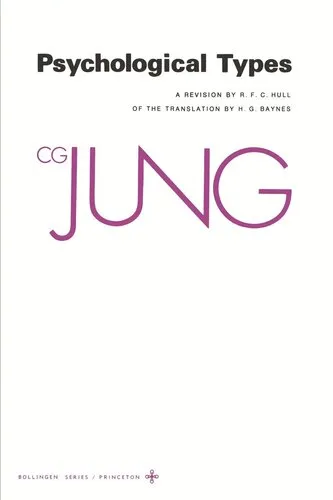Collected Works of C.G. Jung. Volume 6 Collected Works of C. G. Jung, Volume 6: Psychological Types
4.7
بر اساس نظر کاربران

شما میتونید سوالاتتون در باره کتاب رو از هوش مصنوعیش بعد از ورود بپرسید
هر دانلود یا پرسش از هوش مصنوعی 2 امتیاز لازم دارد، برای بدست آوردن امتیاز رایگان، به صفحه ی راهنمای امتیازات سر بزنید و یک سری کار ارزشمند انجام بدینمعرفی کتاب
کتاب 'Collected Works of C.G. Jung. Volume 6: Psychological Types' اثر کارل گوستاو یونگ یکی از آثار برجسته در زمینه روانشناسی تحلیلی است که به تحلیل و تبیین تیپهای روانی میپردازد. این کتاب به دلیل نقش مهمی که در توسعه نظریه روانشناسی تعهد ایفا کرده است، از اهمیت بالایی برخوردار میباشد.
خلاصهای از کتاب
در این جلد، یونگ مفهوم تیپهای روانی را معرفی میکند که به طبقهبندی ویژگیهای شخصیتی افراد و نحوه تأثیرگذاری آنها بر رفتار و تعاملات اجتماعی میپردازد. یونگ دههها تحقیق و مطالعه را صرف توسعه این نظریه کرده است که تأکید بر تفاوتهای فردی و همچنین شیوههای متنوع تفکر و احساس دارند. این کتاب، چهار تیپ اصلی روانی را به طور دقیق بررسی میکند: Introvert و Extravert به عنوان تیپهای نگرشی و همچنین Sensation، Intuition، Thinking و Feeling به عنوان تیپهای عملکردی.
نکات کلیدی
- تفاوتهای شخصیتی بنیادین: نقش تیپهای Introvert و Extravert در رفتارها و واکنشهای افراد.
- روانشناسی تحلیلی: تحلیل پیچیدگیهای روانی انسان و ساختارهای گوناگون ذهنی.
- بهرهوری از ویژگیهای فردی: چگونه میتوان از شناخت تیپهای روانی در زندگی شخصی و حرفهای بهره برد.
جملات معروف از کتاب
"شناخت خود بهترین راه ورود به دنیای دیگران است."
"تیپهای روانی نقش حیاتی در زندگی اجتماعی و تعاملات انسانی ایفا میکنند."
چرا این کتاب مهم است
این کتاب به عنوان یکی از آثار پایهای در زمینه روانشناسی تحلیلی شناخته میشود و تاثیرات عمیقی بر نحوه درک و فهم تیپهای شخصیتی داشته است. مباحث ارائه شده در این اثر نه تنها به علاقهمندان به روانشناسی کمک میکند تا به درک عمیقتری از ساختار روانی انسان دست یابند، بلکه ابزار مهمی برای رواندرمانگران، مشاوران و حتی مدیران سازمانها جهت بهینهسازی عملکرد و تعاملات انسانی فراهم میسازد. این کتاب دریچهای به سوی خودشناسی و درک دیگران باز میکند که در زمانه ما بینهایت ارزشمند است.
Introduction to 'Collected Works of C.G. Jung, Volume 6: Psychological Types'
The sixth volume of Carl Gustav Jung's Collected Works, titled "Psychological Types," serves as a cornerstone in analytical psychology and offers profound insights into understanding human personality. With meticulous research and keen psychological acumen, Jung presents a framework that categorizes psychological differences into a typology that has influenced psychological theory and practice for decades. This volume not only presents a breakthrough in psychological theory but also lays the groundwork for several modern psychological assessment tools.
Summary of the Book
"Psychological Types" explores the concept of personality types and distinguishes between different modes of experiencing the world. Jung identifies two primary orientations of energy: extroversion and introversion. Extroverted types are characterized by their focus on the external world, engaging actively and perceiving stimuli from their surroundings, while introverts are oriented towards the inner world, reflecting and processing experiences internally.
The book further delves into the four primary psychological functions: thinking, feeling, sensation, and intuition. Each of these functions can manifest as dominant or auxiliary, creating diverse personality configurations and unique individual profiles. These dichotomies result in an array of psychological types that define the myriad ways in which people interact with the world.
Jung's exploration extends beyond mere definitions; he delves into how these types affect personal development, relationships, and societal dynamics. His work provides a lens through which psychological phenomena can be systematically understood, serving as a vital tool for therapists and individuals alike.
Key Takeaways
- Introduction of extroversion and introversion as fundamental personality orientations.
- Development of four psychological functions: thinking, feeling, sensation, and intuition.
- Conceptual foundation for several modern psychological assessment tools, such as the Myers-Briggs Type Indicator (MBTI).
- Insight into how different personality types influence behavior, interaction, and personal growth.
- Framework that assists therapists in understanding client dynamics and individual differences.
Famous Quotes from the Book
"Everything that irritates us about others can lead us to an understanding of ourselves."
"We cannot change anything until we accept it. Condemnation does not liberate, it oppresses."
Why This Book Matters
"Psychological Types" serves as a seminal text for those interested in psychological theories, providing a foundational understanding of personality assessment that continues to impact psychology today. Jung's typological theory has not only enriched academic discourse but has also permeated popular culture, influencing self-help literature and identity exploration.
This volume stands out because it addresses the diversity of human experience and blends scientific analysis with introspective insight. By offering a structured yet flexible understanding of personality, Jung empowers readers to appreciate individual differences, nurture personal growth, and improve interpersonal relationships.
Moreover, therapists benefit from Jung's typology by gaining better insights into patient behaviors and refining their therapeutic approaches. In a world increasingly focused on self-awareness and personal development, "Psychological Types" remains a relevant and valuable resource.
دانلود رایگان مستقیم
You Can Download this book after Login
دسترسی به کتابها از طریق پلتفرمهای قانونی و کتابخانههای عمومی نه تنها از حقوق نویسندگان و ناشران حمایت میکند، بلکه به پایداری فرهنگ کتابخوانی نیز کمک میرساند. پیش از دانلود، لحظهای به بررسی این گزینهها فکر کنید.
این کتاب رو در پلتفرم های دیگه ببینید
WorldCat به شما کمک میکنه تا کتاب ها رو در کتابخانه های سراسر دنیا پیدا کنید
امتیازها، نظرات تخصصی و صحبت ها درباره کتاب را در Goodreads ببینید
کتابهای کمیاب یا دست دوم را در AbeBooks پیدا کنید و بخرید


